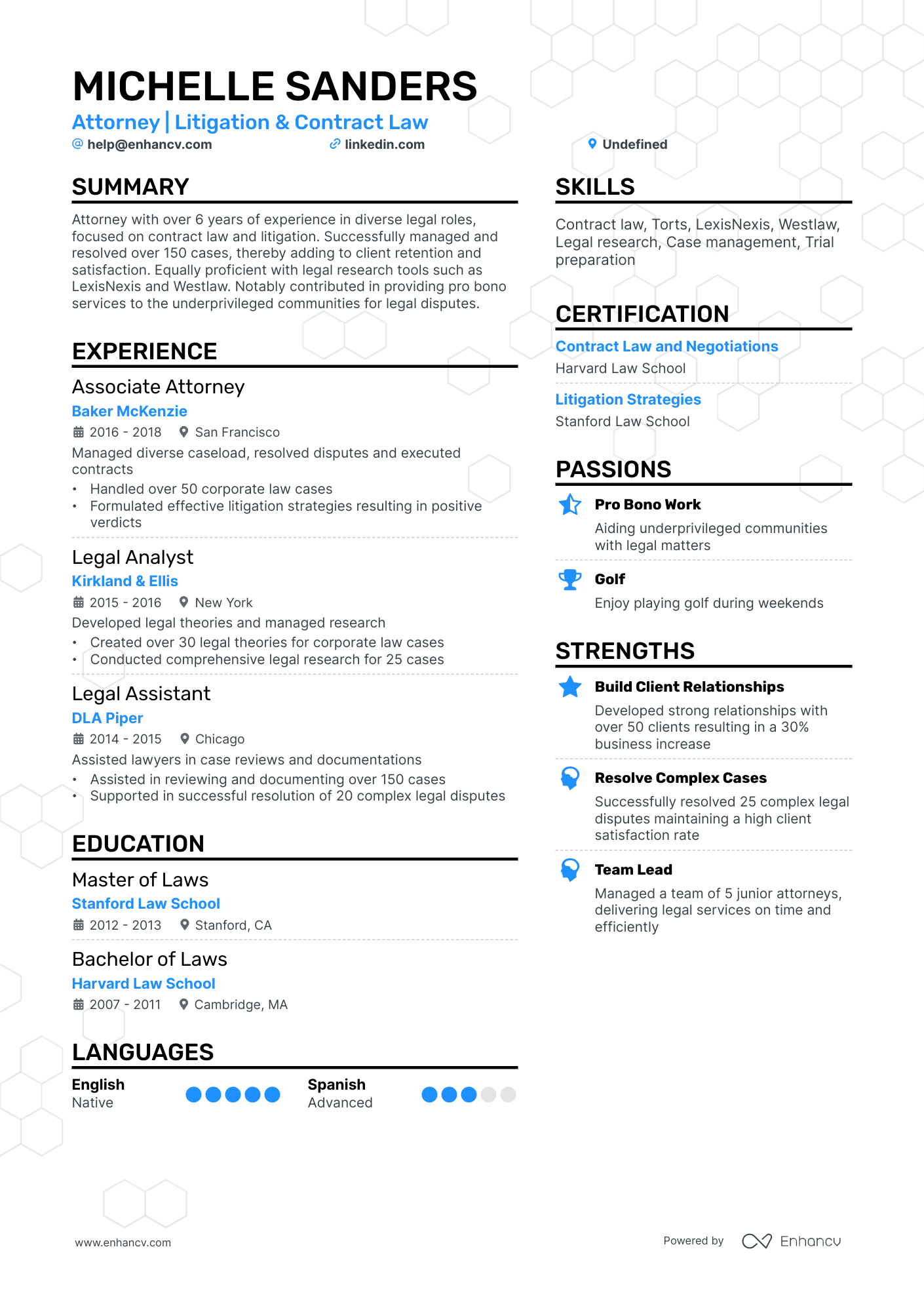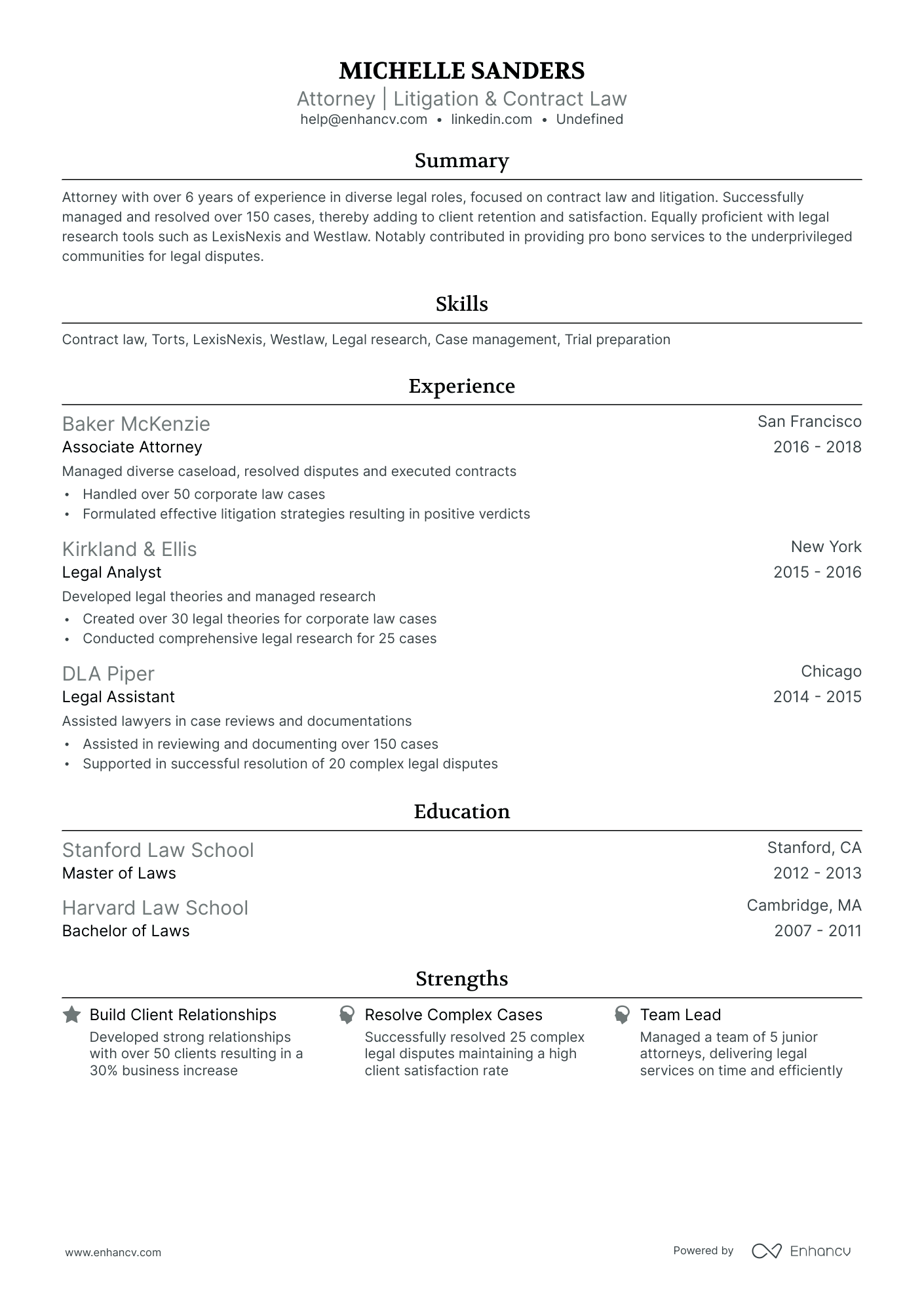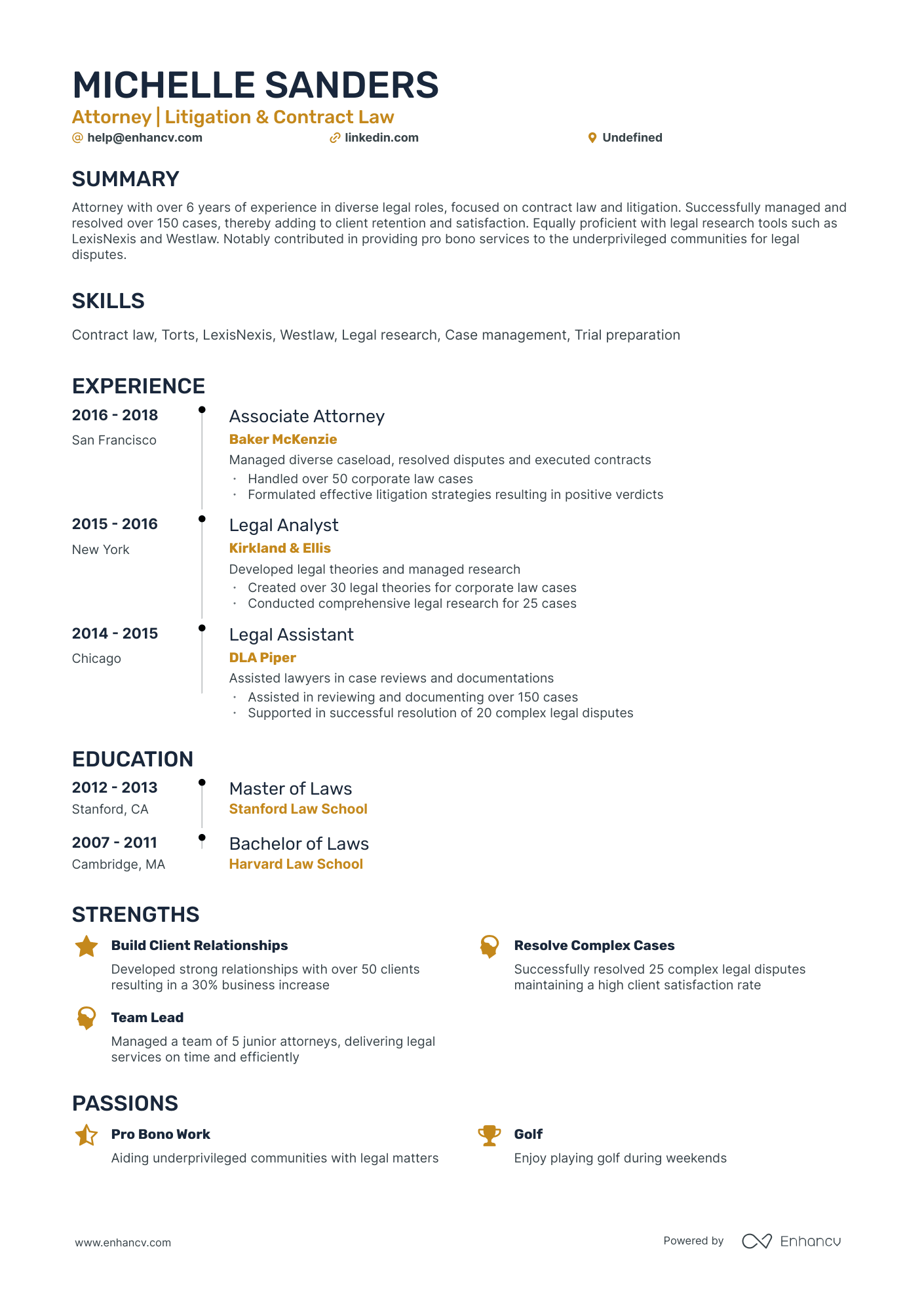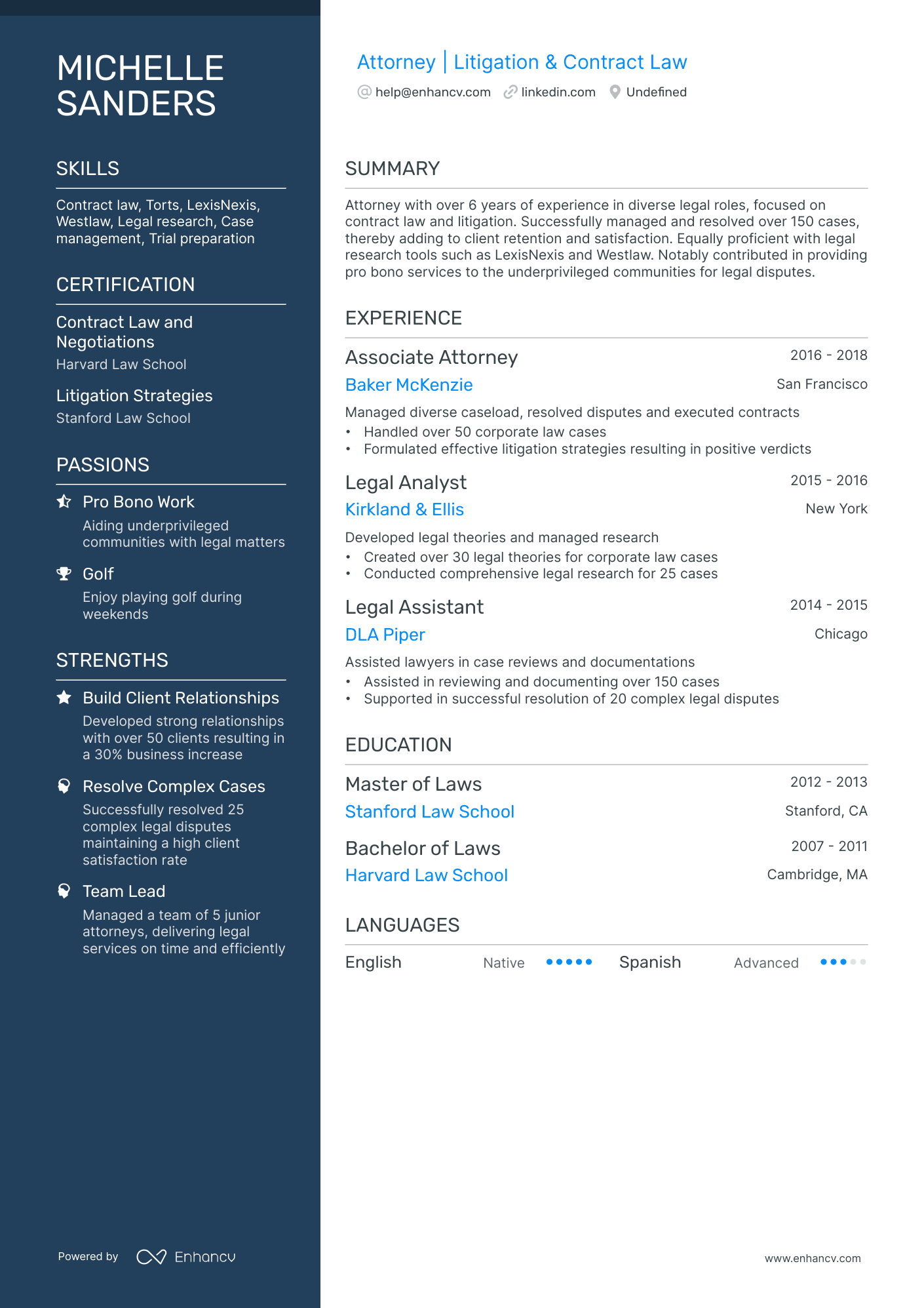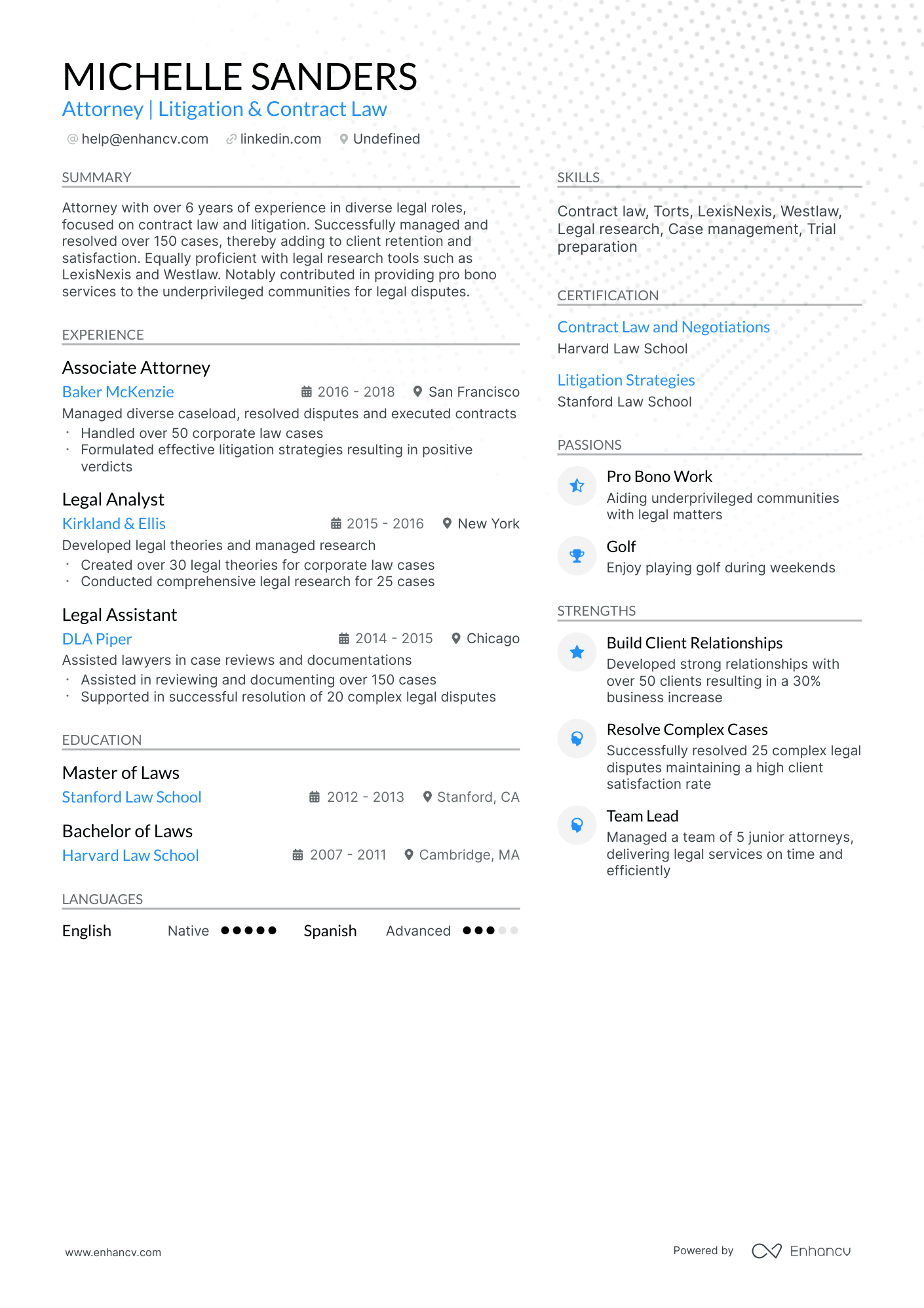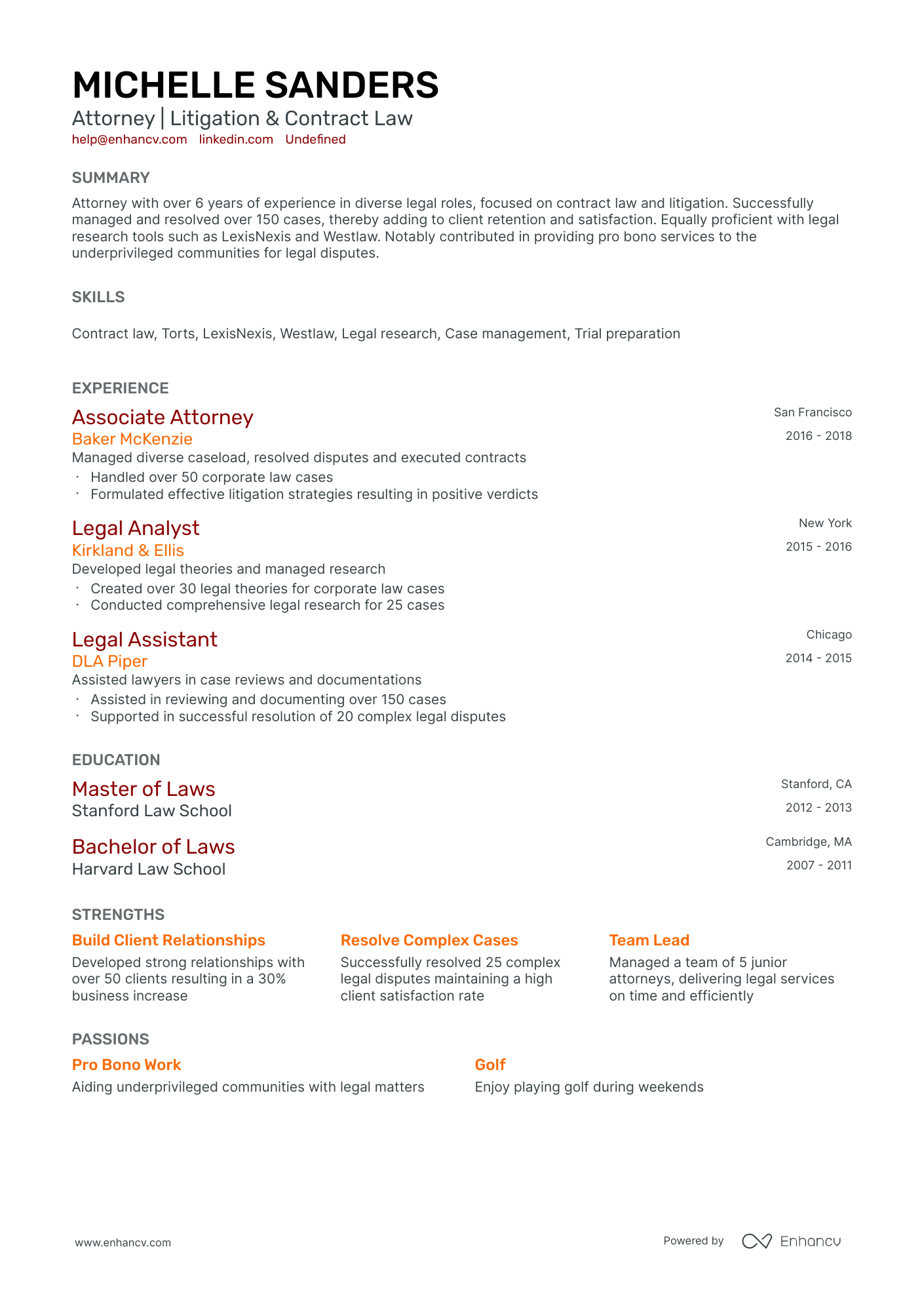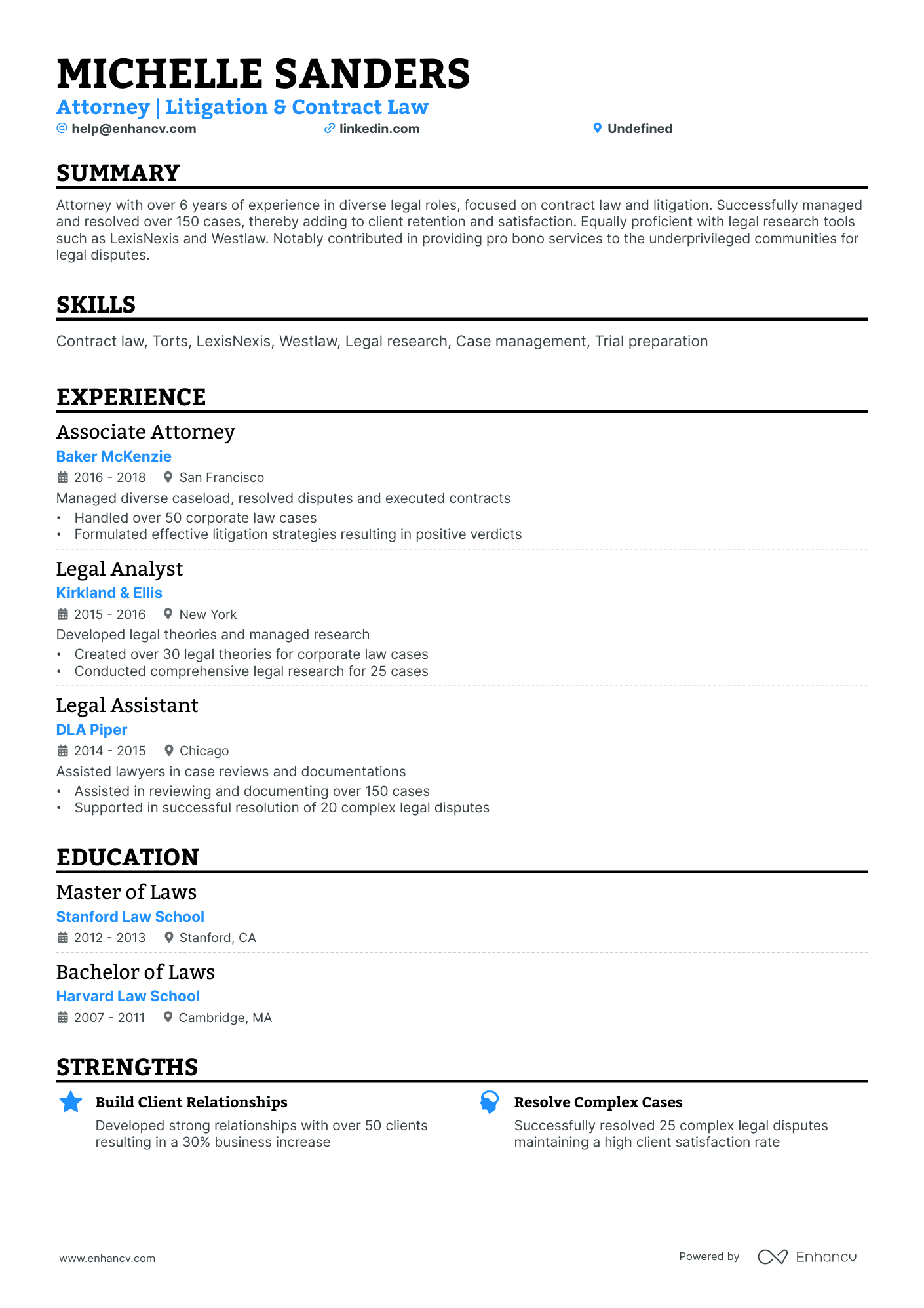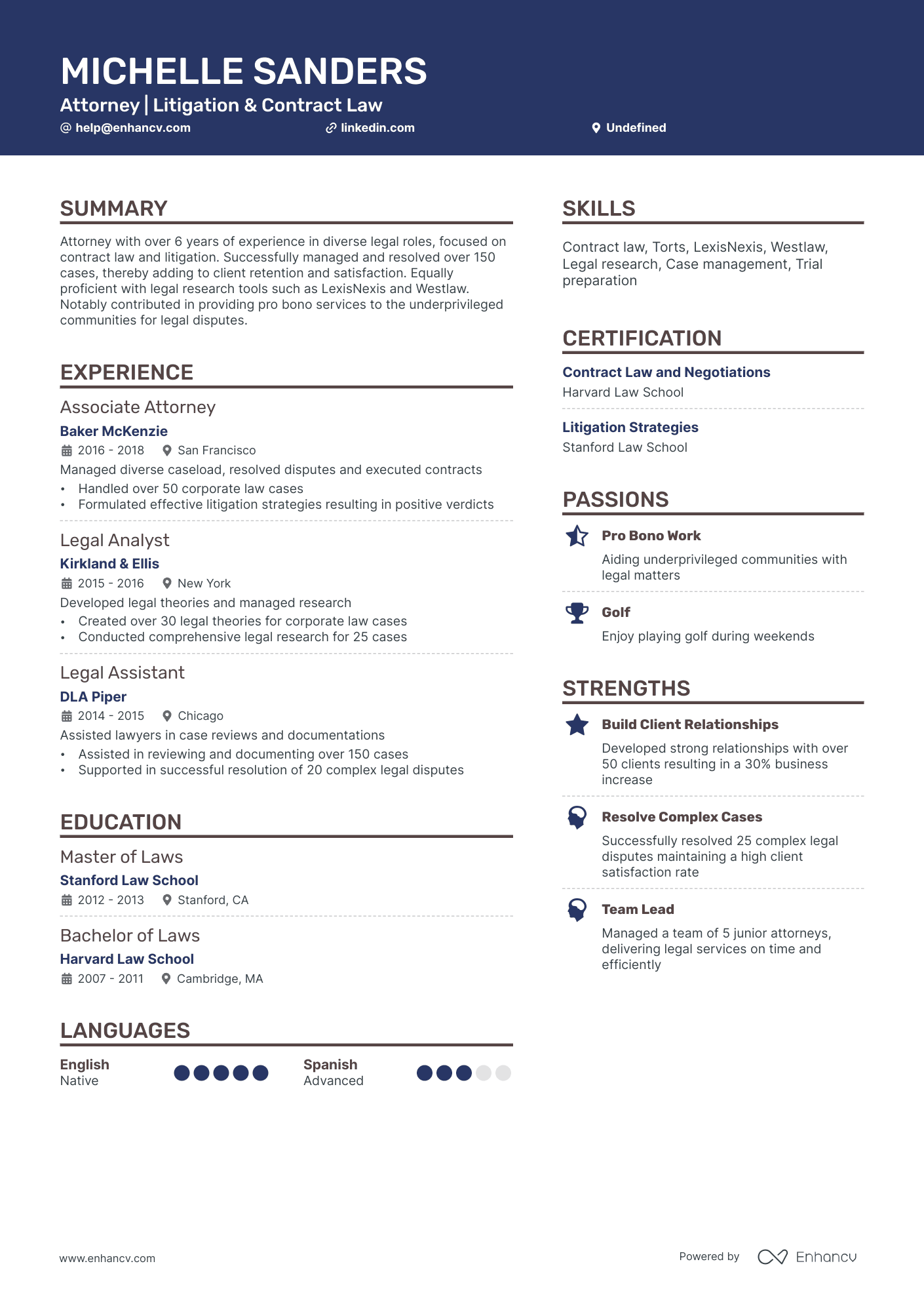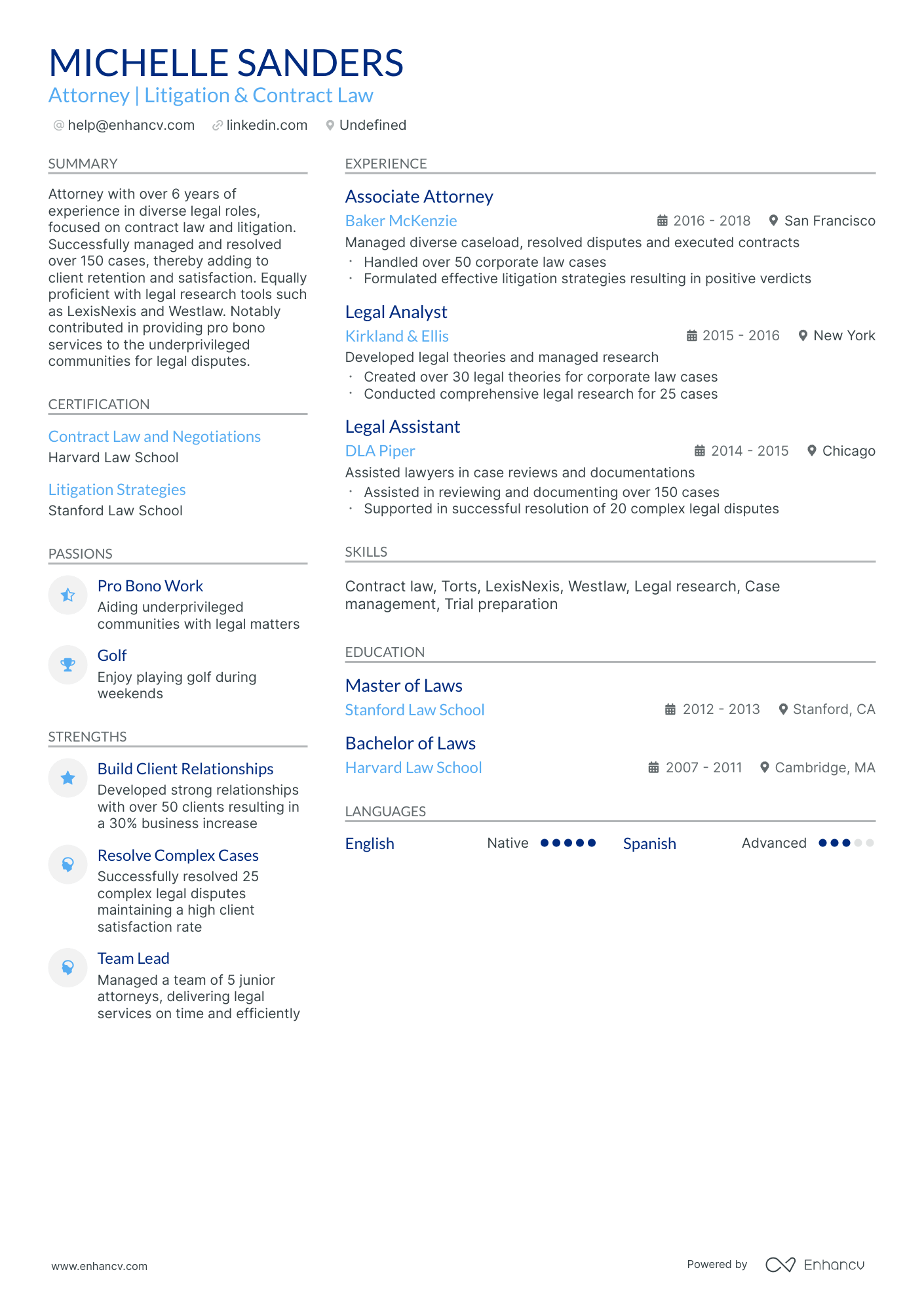Entry-level attorneys often grapple with the challenge of limited legal experience, making it difficult to populate their resumes in a way that is compelling to potential employers. Our guide can assist by offering strategies for highlighting transferable skills from other experiences (like internships, moot court, or law school coursework), ensuring your resume demonstrates your potential as an effective attorney despite your lack of extensive professional legal experience.
Dive into our entry-level attorney resume guide to:
- Explore top-tier resume examples, offering insights into the industry's best practices.
- Enhance sections like experience, education, and achievements with expert advice.
- Articulate your technical prowess and personal attributes, setting you apart from other candidates.
- Sharpen your focus on the distinct skills that make your entry-level attorney resume resonate with recruiters.
Recommended reads:
Designing your entry-level attorney resume: best practices
Before penning down your entry-level attorney resume, consider its structure and format. Here's what you should remember:
- Employ the reverse-chronological format to present your experience, starting with your most recent role.
- Your resume's header should feature accurate, professional contact details. If you maintain a professional portfolio or LinkedIn profile, include its link.
- Keep your resume concise, ideally within two pages. Prioritize relevance over length.
- Unless directed otherwise, save your resume as a PDF to preserve its design.
Upload your resume
Drop your resume here or choose a file. PDF & DOCX only. Max 2MB file size.
Pro tip
At the end of the day, recruiters care most about how easily they can scan and read your resume layout. Unless you're aiming for a role in a creative field, it might be best to stick with a straightforward layout and format. Instead, put your energy into showcasing your experience.
Key sections to include in your entry-level attorney resume are:
- The header - with your contact details (like email and phone number), a link to your portfolio, and a headline.
- The summary (or objective) - highlighting the high points of your career so far.
- The experience section - limit yourself to six bullets per role to focus on specific results.
- The skills list - offering a balanced mix of your personal and professional talents.
- Education and certification - displaying your most relevant degrees and certificates for the entry-level attorney role.
What recruiters want to see on your resume:
- Education: A Law degree from a reputable institution is mandatory. Details of the law school attended, GPA, and any honors or awards received are given substantial weight.
- Bar Admission: Being admitted to the state bar in the location where the job is based is a primary requirement for practicing law. It provides evidence of legal competence and readiness to practice law.
- Internships and Clerkships: Relevant experience gained through internships or clerkships during law school can significantly enhance an entry-level attorney resume. They provide practical knowledge of the legal system and demonstrate initiative and dedication.
- Skills: Critical thinking, research, communication, and negotiation skills are highly valued in this profession. Additionally, proficiency in legal research tools like LexisNexis and Westlaw can be a plus.
- Legal Specialization: While not always necessary for entry-level positions, having a focus area or specialization (like family law, criminal defense, or corporate law) can set a candidate apart by showing targeted interest and study in a particular field of law.
Recommended reads:
Optimizing the experience section of your entry-level attorney resume
The experience section is pivotal—it bridges the gap between your qualifications and the job's requirements.
To craft an impactful entry-level attorney experience section, consider these guidelines:
- Review the job posting to identify key requirements and align your past roles with these needs.
- Go beyond listing skills—demonstrate their impact through quantifiable achievements.
- Exclude roles that don't enhance your application or showcase relevant skills.
- While technical expertise is crucial, also highlight soft skills that add value to your role.
- Use action verbs to articulate your accomplishments and the skills employed to achieve them.
Below, we've provided entry-level attorney resume samples to inspire your experience section, ensuring it adheres to industry best practices.
- Conducted legal research and analysis for cases in the area of corporate law.
- Drafted legal documents, including contracts, agreements, and memoranda.
- Assisted attorneys in preparing for trials and client meetings.
- Participated in client interviews and deposition preparations.
- Contributed to the development of trial strategies and case presentations.
- Assisted senior attorneys in conducting due diligence for mergers and acquisitions.
- Researched and analyzed statutes, regulations, and case law in various practice areas.
- Drafted legal documents, such as pleadings, motions, and briefs.
- Attended court hearings and trials to observe courtroom procedures.
- Collaborated with a team of attorneys on complex litigation cases.
- Supported legal scholars in researching and writing academic articles and publications.
- Reviewed and summarized court decisions, legal statutes, and scholarly materials.
- Assisted in editing and proofreading legal manuscripts for publication.
- Created comprehensive legal databases and organized research materials.
- Participated in research presentations and conferences.
- Provided free legal services to low-income clients under the supervision of experienced attorneys.
- Conducted client interviews, assessed legal issues, and developed case strategies.
- Drafted legal documents, including complaints, petitions, and settlement agreements.
- Negotiated settlements with opposing parties resulting in favorable outcomes for clients.
- Presented oral arguments and represented clients in administrative hearings.
- Assisted attorneys in preparing legal documents, such as contracts, wills, and trusts.
- Conducted factual research and gathered relevant evidence for cases.
- Managed case files, organized exhibits, and prepared trial notebooks.
- Coordinated with clients, court personnel, and other law firms to schedule meetings and depositions.
- Assisted in trial preparation and attended trials to provide support to attorneys.
- Represent clients in various civil litigation matters, including contract disputes and personal injury cases.
- Conduct legal research and draft pleadings, motions, and discovery requests.
- Prepare clients for depositions and assist in conducting witness interviews.
- Negotiate settlements on behalf of clients resulting in cost savings and favorable outcomes.
- Collaborate with senior attorneys on complex cases and trial preparations.
- Analyzed and summarized legal documents, statutes, and regulations for compliance purposes.
- Assisted in drafting and reviewing contracts, leases, and corporate governance documents.
- Conducted due diligence investigations for mergers and acquisitions.
- Provided legal research and support to attorneys in various practice areas.
- Developed and implemented document management systems for efficient case handling.
- Aided attorneys in preparing for trials by conducting research on case law and relevant legal precedents.
- Drafted legal memoranda analyzing complex legal issues for court submissions.
- Assisted in the preparation of trial exhibits, witness statements, and deposition summaries.
- Attended client meetings and assisted in negotiating settlements.
- Conducted discovery processes, including document review and analysis.
- Supported attorneys in drafting legal documents, including contracts and agreements.
- Conducted legal research and analysis on labor and employment law issues.
- Assisted in preparing for mediations and arbitrations by gathering evidence and witness statements.
- Managed calendars, scheduled appointments, and coordinated meetings with clients.
- Maintained and organized confidential client files and documents.
- Represented clients in bankruptcy proceedings, including filing petitions and attending hearings.
- Negotiated with creditors to reach debt settlement agreements benefiting clients.
- Conducted legal research on bankruptcy laws, exemptions, and dischargeability of debts.
- Drafted bankruptcy petitions, schedules, and other related documents.
- Advised clients on bankruptcy alternatives and provided guidance throughout the process.
Quantifying impact on your resume
<ul>
Strategies for candidates with limited resume experience
Lack of extensive experience doesn't mean you can't make a strong impression. Here's how:
- Thoroughly understand the role's requirements and reflect them in key resume sections.
- Highlight transferable skills and personal attributes that make you a valuable candidate.
- Use the resume objective to articulate your growth vision within the company.
- Emphasize technical alignment through relevant certifications, education, and skills.
Remember, your resume's primary goal is to showcase how you align with the ideal candidate profile. The closer you match the job requirements, the higher your chances of securing an interview.
Pro tip
The wording of your experience items should be with active, power verbs, instead of adjectives. Always be specific about each item you detail, and never overuse vague buzzwords. You weren't just "organized", but rather "Enhanced internal work processes to optimize operational management by 65%".
Spotlighting your entry-level attorney hard and soft skills
Hard skills denote your technological proficiency and expertise in specific tools or software. These skills are often validated through certifications and hands-on experience.
Soft skills, on the other hand, reflect your interpersonal abilities and how you navigate workplace dynamics. These skills are cultivated over a lifetime and can be more nuanced.
Why the emphasis on both? Hard skills demonstrate your technical competence and reduce training needs. Soft skills suggest adaptability and cultural fit.
To optimize your skills section:
- Forego basic skills like "Excel" in favor of more specific proficiencies like "Excel Macros".
- Highlight core values and work ethics as soft skills, indicating what you prioritize in a professional setting.
- If relevant, create a distinct section for language proficiencies.
- Balance hard and soft skills by crafting a strengths or achievements section, illustrating outcomes achieved through both skill sets.
To assist you, we've curated a list of skills highly sought after by recruiters. Ensure you integrate those that resonate with your expertise and the prospective employer's needs:
Top skills for your entry-level attorney resume:
Legal Research
Westlaw
LexisNexis
Contract Drafting
Case Management Software
Document Review Tools
Microsoft Office Suite
Legal Writing
Citation Tools
Court Filing Systems
Communication
Critical Thinking
Time Management
Attention to Detail
Analytical Skills
Interpersonal Skills
Problem-Solving
Negotiation
Teamwork
Adaptability
Pro tip
Double-check the spelling of all skills and tools on your resume. Remember, software like the Applicant Tracker System (ATS) scans for these details.
Highlighting certifications and education on your entry-level attorney resume
Your academic achievements, including certifications and degrees, bolster your application. They showcase your skills and commitment to the field.
To effectively present these on your resume:
- Highlight significant academic achievements or recognitions relevant to the role.
- Be selective; prioritize the most relevant and impressive certifications.
- Include essential details: certificate/degree name, institution, graduation dates, and license numbers (if applicable).
- Present your academic background in reverse chronological order, emphasizing the most recent and relevant qualifications.
For further guidance, explore popular industry certifications.
Best certifications to list on your resume
Pro tip
Listing your relevant degrees or certificates on your entry-level attorney resume is a win-win situation. Not only does it hint at your technical capabilities in the industry, but also at a range of soft skills, including perseverance, adaptability, and motivation.
Recommended reads:
Should you add a summary or objective to your entry-level attorney resume?
Choose between:
- Resume summary to match job needs with your top wins.
- Resume objective to share your career goals.
Both should tell recruiters about your best moments. Keep them short, around five sentences. Check out our sample structures for guidance.
Resume summary and objective examples for a entry-level attorney resume
- Accomplished attorney with five years of experience in corporate law, strengthening analytical and negotiation abilities at ABC Law. Expert in due diligence, contract drafting, and corporate governance. Credited with saving clients over $2M in potential lawsuit expenses.
- Energetic litigator with seven years of practice in civil litigation at a top-tier law firm. Skilled in case analysis, trial preparation, and legal research. Successfully represented high-profile clients in court, achieving an 80% success rate.
- Career pivot from financial consulting to legal practice. Armed with an MBA and five years of experience analyzing financial transactions for XYZ Consulting, now leveraging this background in a legal setting after earning a JD. Exceptional skills in negotiation, risk assessment, and regulatory compliance.
- Data analyst pivoting to law with a fresh JD degree. Equipped with ten years of experience at DEF Corporation, where I specialized in data privacy and security. Proven ability to translate complex concepts into understandable terms, aiming to use this skill in explaining legal jargons to clients.
- Recent JD graduate seeking to apply educational knowledge in practical settings. Eager to contribute strong research, communication, and problem-solving skills towards protecting and advancing client interests. Motivated by the core values of transparency and justice, as implemented by ABC Law Firm.
- JD holder with no prior experience in the field, keen to launch a career in family law at XYZ Firm. Committed to helping families navigate legal complexities with compassion and integrity. Adept at research, case analysis, and oral advocacy as demonstrated through moot court experiences.
Optimize your resume summary and objective for ATS
Drop your resume here or choose a file.
PDF & DOCX only. Max 2MB file size.
Extra sections to include in your entry-level attorney resume
What should you do if you happen to have some space left on your resume, and want to highlight other aspects of your profile that you deem are relevant to the role?
Add to your entry-level attorney resume some of these personal and professional sections:
- Passions/Interests - to detail how you spend both your personal and professional time, invested in various hobbies;
- Awards - to present those niche accolades that make your experience unique;
- Publications - an excellent choice for professionals, who have just graduated from university or are used to a more academic setting;
- < a href="https://enhancv.com/blog/volunteering-on-resume/"> Volunteering - your footprint within your local (or national/ international) community.
Key takeaways
- Craft a entry-level attorney resume that's easy to read and aligns with the role's requirements.
- The top third of your resume should clearly convey your unique value proposition for the entry-level attorney role.
- Tailor your resume to the job, highlighting skills, achievements, and the tangible results of your efforts.
- Detail your certifications and technical skills to demonstrate proficiency with specific tools and technologies.
- The sections you choose should collectively present a comprehensive view of your professional expertise and personality.
